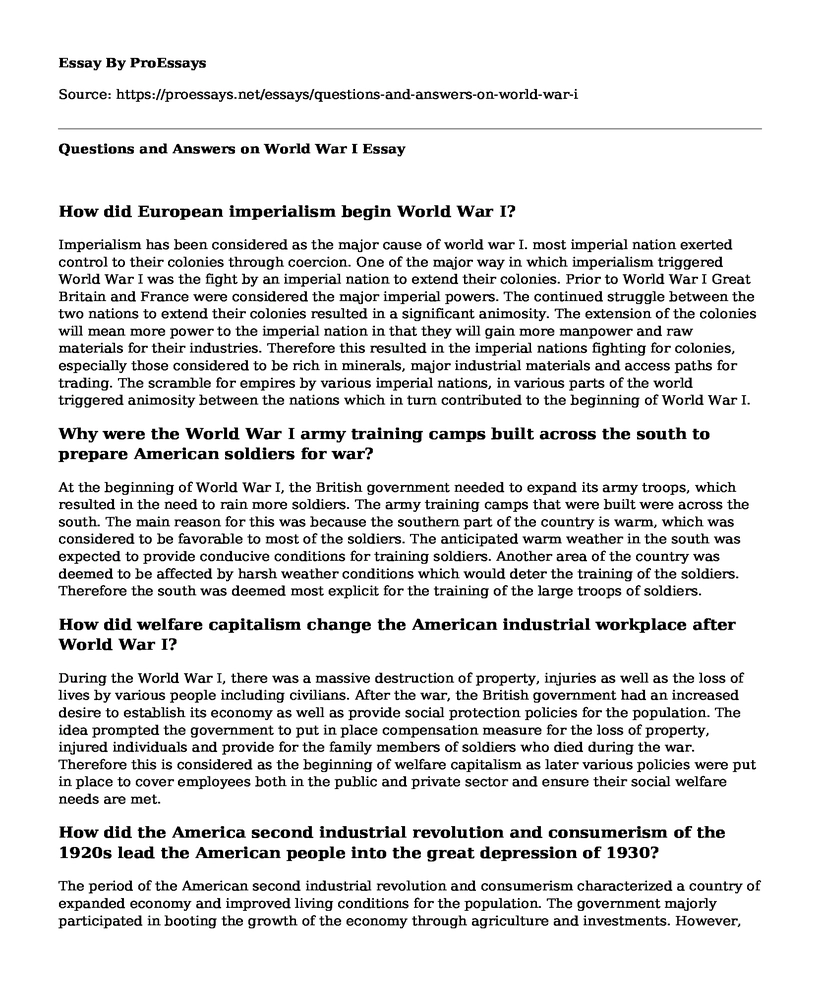How did European imperialism begin World War I?
Imperialism has been considered as the major cause of world war I. most imperial nation exerted control to their colonies through coercion. One of the major way in which imperialism triggered World War I was the fight by an imperial nation to extend their colonies. Prior to World War I Great Britain and France were considered the major imperial powers. The continued struggle between the two nations to extend their colonies resulted in a significant animosity. The extension of the colonies will mean more power to the imperial nation in that they will gain more manpower and raw materials for their industries. Therefore this resulted in the imperial nations fighting for colonies, especially those considered to be rich in minerals, major industrial materials and access paths for trading. The scramble for empires by various imperial nations, in various parts of the world triggered animosity between the nations which in turn contributed to the beginning of World War I.
Why were the World War I army training camps built across the south to prepare American soldiers for war?
At the beginning of World War I, the British government needed to expand its army troops, which resulted in the need to rain more soldiers. The army training camps that were built were across the south. The main reason for this was because the southern part of the country is warm, which was considered to be favorable to most of the soldiers. The anticipated warm weather in the south was expected to provide conducive conditions for training soldiers. Another area of the country was deemed to be affected by harsh weather conditions which would deter the training of the soldiers. Therefore the south was deemed most explicit for the training of the large troops of soldiers.
How did welfare capitalism change the American industrial workplace after World War I?
During the World War I, there was a massive destruction of property, injuries as well as the loss of lives by various people including civilians. After the war, the British government had an increased desire to establish its economy as well as provide social protection policies for the population. The idea prompted the government to put in place compensation measure for the loss of property, injured individuals and provide for the family members of soldiers who died during the war. Therefore this is considered as the beginning of welfare capitalism as later various policies were put in place to cover employees both in the public and private sector and ensure their social welfare needs are met.
How did the America second industrial revolution and consumerism of the 1920s lead the American people into the great depression of 1930?
The period of the American second industrial revolution and consumerism characterized a country of expanded economy and improved living conditions for the population. The government majorly participated in booting the growth of the economy through agriculture and investments. However, the period ended in a crash as the great depression begun in the 1930s. The second industrial revolution and consumerism are considered to be the contributing factors to the great depression. This is due to the fact that as the economy increases the population spending was uncontrolled and unplanned. Banks ended up giving huge loans to clients. The loans were put in unplanned investments like the stock markets. Most of the investment ended up giving less or no returns which lead to deterioration of the economy hence the great depression of the 1930s.
Explain the three R's of Franklin Roosevelt's new deal to the American people
During the great depression, the then president Franklin Roosevelt put in place strategies that would ensure a quick recovery. The strategies involved the three R's, which are the Relief, Recovery, and Reform. Relief was the initial step taken to curb a further deterioration of the economy. The main action taken through the relief was the implementation of social security act. During the depression most of the American population lived below the poverty line, most were unemployed and lived in poor conditions. The act was deemed to provide security and pension for retirees and the disabled. The act prevented panic and provided relief to the citizens. The recovery stage initiated programs that were aimed to help in the restating of the flow of consumer demand hence recovery of the economy. The recovery involved aiming to contain the food prices which were escalating at the time, which saw the introduction of the agricultural adjustment act. The act ensured that the government taxed food processors and paid the farmers directly. Another recovery plan was offering loans to homeowners in order to pay off their mortgages. Work progress administration was another recovery strategy which ensured that most citizens were employed through the construction of public amenities like schools. Reform involved strategies put in place to ensure maintenance of the economy and to curb another depression from occurring. The president instantiated the formation of Securities and Exchange Commission to monitor the stock market activities and ensure that fraud is curbed in order to provide a stable market. National labor relation act was also implemented to ensure that labor laws and fair business practices were upheld.
Cite this page
Questions and Answers on World War I. (2022, May 09). Retrieved from https://proessays.net/essays/questions-and-answers-on-world-war-i
If you are the original author of this essay and no longer wish to have it published on the ProEssays website, please click below to request its removal:
- The Life and Works of Chopin Essay
- Implementation of International Humanitarian Law - Exploratory Essay
- Why Renaissance Began in Florence? - Essay Sample
- The History of Organized Labor - Paper Example
- The Myth of Romulus and Remus Essay
- Essay Sample on Hart-Cellar Act 1965: Reuniting Families & Attracting Skilled Labor
- Essay Example on Steve Irwin: Wildlife Conservationist, Educator & TV Star







